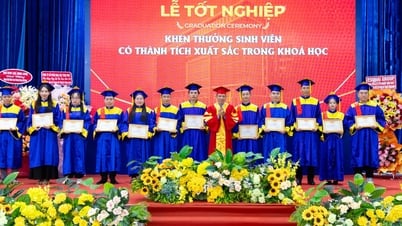International Economics graduates can work at trade and investment agencies and embassies; while International Business graduates often work at enterprises.
At the admissions consultation session on July 9 of the National Economics University, many students asked how to distinguish between International Economics and International Business. Below is the sharing of Associate Professor Dr. Ta Van Loi, Director of the Institute of International Trade and Economics, about the differences between these two majors.
International economics
- Concept and curriculum: This is a research field, focusing on macroeconomic issues.
At the National Economics University, the International Economics program has a duration of 130 credits, including subjects such as International Economics, World Economy, Foreign Economic Policy, International Economic Integration... The program is referenced from the training framework of Florida International University, which has been accredited according to US standards.
- Output standards: The International Economics major trains bachelors with basic and modern knowledge of world economics, economic relations and international organizations and institutions.
- Jobs after graduation: State management agencies of trade, investment and international services; international organizations, foreign affairs agencies, embassies; representative agencies of trade and investment of Vietnam abroad; universities, research institutes on world economy, regional economy, international institutions and international economic relations; domestic and foreign enterprises.
- Transfer opportunities: International Economics students have the opportunity to transfer 3+1 to Northampton University (UK), Waikato (New Zealand), and be introduced to work and study in Japan.

Associate Professor, Dr. Ta Van Loi, Director of the Institute of International Trade and Economics, National Economics University. Photo: Provided by the character
International Business
- Concept and curriculum: This is a field of study, focusing on micro issues, such as business administration activities of enterprises on an international scale.
The International Business program also includes 130 credits, including subjects such as International Business, International Supply Chain Management, Import-Export Operations, International Marketing, International Finance, International Human Resources and International Accounting... Students can choose one of two advanced and high-quality programs, both using the curriculum of the University of California (USA).
- Output standards: International Business graduates are equipped with specialized knowledge and working skills in a professional, highly competitive international environment.
- Jobs after graduation: Multinational and transnational companies, FDI, import and export; representative offices of foreign companies; international organizations; central foreign affairs agencies, Government ; central and local economic management agencies; commercial counselors of countries; economic research departments and institutes in and outside the country.
- Transfer opportunities: Advanced transfer program 3+1 at Saxion University (Netherlands), University of Northampton (UK), Waikato (New Zealand); 2+2 at University of San Bernadino California (USA).
In general, International Business and International Economics are suitable for dynamic people who want to have an international working style in foreign companies, helping themselves develop according to standards that can compete with international human resources.
Associate Professor, Dr. Ta Van Loi
Source link


![[Photo] Readers line up to visit the photo exhibition and receive a special publication commemorating the 135th birthday of President Ho Chi Minh at Nhan Dan Newspaper](https://vphoto.vietnam.vn/thumb/1200x675/vietnam/resource/IMAGE/2025/5/17/85b3197fc6bd43e6a9ee4db15101005b)



![[Photo] More than 17,000 candidates participate in the 2025 SPT Competency Assessment Test of Hanoi National University of Education](https://vphoto.vietnam.vn/thumb/1200x675/vietnam/resource/IMAGE/2025/5/17/e538d9a1636c407cbb211b314e6303fd)
![[Photo] Prime Minister Pham Minh Chinh chairs meeting on science and technology development](https://vphoto.vietnam.vn/thumb/1200x675/vietnam/resource/IMAGE/2025/5/17/ae80dd74c384439789b12013c738a045)





























![[Photo] Nearly 3,000 students moved by stories about soldiers](https://vphoto.vietnam.vn/thumb/1200x675/vietnam/resource/IMAGE/2025/5/17/21da57c8241e42438b423eaa37215e0e)







































































Comment (0)